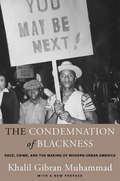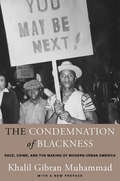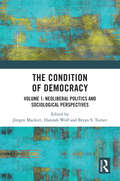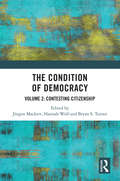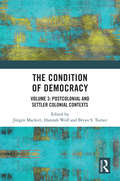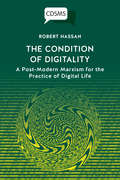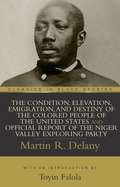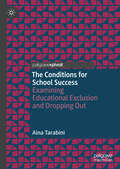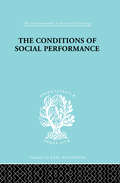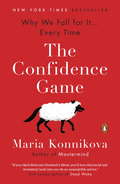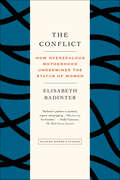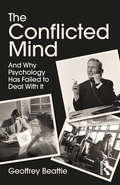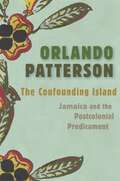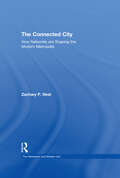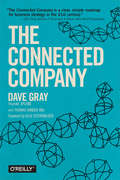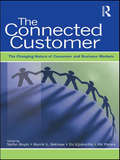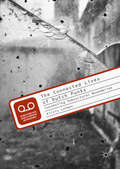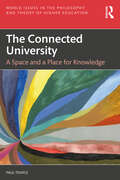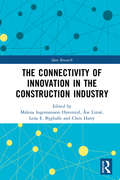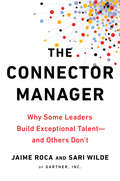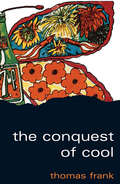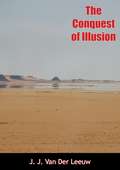- Table View
- List View
The Condemnation of Blackness: Race, Crime, and the Making of Modern Urban America, With a New Preface
by Khalil Gibran MuhammadChronicling the emergence of deeply embedded notions of black people as a dangerous race of criminals by explicit contrast to working-class whites and European immigrants, this fascinating book reveals the influence such ideas have had on urban development and social policies.
The Condemnation of Blackness: Race, Crime, and the Making of Modern Urban America, With a New Preface
by Khalil Gibran MuhammadChronicling the emergence of deeply embedded notions of black people as a dangerous race of criminals by explicit contrast to working-class whites and European immigrants, this fascinating book reveals the influence such ideas have had on urban development and social policies.
The Condition of Democracy: Volume 1: Neoliberal Politics and Sociological Perspectives
by Jürgen Mackert, Hannah Wolf and Bryan S. TurnerRecent years have seen contestations of democracy all around the globe. Democracy is challenged as a political as well as a normative term, and as a form of governance. Against the background of neoliberal transformation, populist mobilization, and xenophobic exclusion, but also of radical and emancipatory democratic projects, this collection offers a variety of critical and challenging perspectives on the condition of democracy in the 21st century. The volumes provide theoretical and empirical enquiries into the meaning and practice of liberal democracy, the erosion of democratic institutions, and the consequences for citizenship and everyday lives. With a pronounced focus on national and transnational politics and processes, as well as postcolonial and settler colonial contexts, individual contributions scrutinize the role of democratic societies, ideals, and ideologies of liberal democracy within global power geometries. By employing the multiple meanings of The Condition of Democracy, the collection addresses the preconditions of democratic rule, the state this form of governance is in, and the changing ways in which citizens can (still) act as the sovereign in liberal democratic societies. The books offer both challenging theoretical perspectives and rigorous empirical findings of how to conceive of democracy in our times, which will appeal to academics and students in social and political science, economics, and international relations amongst other fields. The focus on developments in the Middle East and North Africa will furthermore be of great usefulness to academics and the wider public interested in the repercussions of western democracy promotion as well as in contemporary struggles for democratization ‘from below’. During the last 50 years, liberal democracies have been exposed to a fundamental reorganization of their politico-economic structure that transformed them through the impact of neo-liberal economic doctrines focused on low taxation, free markets, and out-sourcing that have little regard in reality for democratic institutions or liberal values. The failures of the neoliberal ‘remedy’ for capitalism are now dramatically obvious through the banking crisis of 2008-2011, the increase in income inequality, the social and psychological damage caused by the austerity packages across Europe, and widespread dependence on experts whose influence over government policies typically goes without public scrutiny. While this has only accelerated the destruction of the social fabric in modern Western societies, the dramatic redistribution of wealth and an open 'politics for the rich' have also revealed the long-time well-covered alliance of the global oligarchy with the Far Right that has the effect of undermining democracy. The contributions to this volume discuss a wide variety of processes of transformation, the social consequences, dedemocratization and illiberalization of once liberal democracies through the destructive impact of neoliberal strategies. These strongly politico-economic contributions are complemented with general sociological analyses of a number of cultural aspects often neglected in analyses of democracy.
The Condition of Democracy: Volume 2: Contesting Citizenship
by Jürgen Mackert, Hannah Wolf and Bryan S. TurnerDemocracy and citizenship are conceptually and empirically contested. Against the backdrop of recent and current profound transformations in and of democratic societies, this volume presents and discusses acute contestations, within and beyond national borders and boundaries. Democracy’s crucial relationships, between state and citizenry as well as amongst citizens, are rearranged and re-ordered in various spheres and arenas, impacting on core democratic principles such as accountability, legitimacy, participation and trust. This volume addresses these refigurations by bringing together empirical analyses and conceptual considerations regarding the access to and exclusion from citizenship rights in the face of migration regulation and institutional transformation, and the role of violence in maintaining or undermining social order. With its critical reflection on the consequences and repercussions of such processes for citizens’ everyday lives and for the meaning of citizenship altogether, this book transgresses disciplinary boundaries and puts into dialogue the perspectives of political theory and sociology.
The Condition of Democracy: Volume 3: Postcolonial and Settler Colonial Contexts
by Jürgen Mackert, Hannah Wolf and Bryan S. TurnerClassical liberal democratic theory has provided crucial ideas for a still dominant and hegemonic discourse that rests on ideological conceptions of freedom, equality, peacefulness, inclusive democratic participation, and tolerance. While this may have held some truth for citizens in Western liberal-capitalist societies, such liberal ideals have never been realized in colonial, postcolonial and settler colonial contexts. Liberal democracies are not simply forms of rule in domestic national contexts but also geo-political actors. As such, they have been the drivers of processes of global oppression, colonizing and occupying countries and people, appropriating indigenous land, annihilating people with eliminatory politics right up to genocides. There can be no doubt that the West – with its civilizational Judeo-Christian idea and divine mission ‘to subdue the world’ – has destroyed other civilizations, countries, trading systems, and traditional ways of life and is responsible for the death of hundreds of millions of human beings in the course of colonizing the world from its Empires of trade through colonialism to settler colonialism and today’s politics of regime change. The book discusses the settler colonial regime that Israel has established in Palestine while still claiming to be a democracy. It discusses the failures of liberal democracy to overcome the structural and racist inequalities in post-Apartheid South Africa, and it presents hopeful outlooks on new ideas and forms of democracy in social movements in the MENA region.
The Condition of Digitality: A Post-Modern Marxism for the Practice of Digital Life (Critical Digital and Social Media Studies #2517-1623)
by Robert HassanDavid Harvey’s The Condition of Postmodernity rationalised capitalism’s transformation during an extraordinary year: 1989. It gave theoretical expression to a material and cultural reality that was just then getting properly started – globalisation and postmodernity – whilst highlighting the geo-spatial limits to accumulation imposed by our planet. However this landmark publication, author Robert Hassan argues, did not address the arrival of digital technology, the quantum leap represented by the move from an analogue world to a digital economy and the rapid creation of a global networked society. Considering first the contexts of 1989 and Harvey’s work, then the idea of humans as analogue beings he argues this arising new human condition of digitality leads to alienation not only from technology but also the environment. This condition he suggests, is not an ideology of time and space but a reality stressing that Harvey’s time-space compression takes on new features including those of ‘outward’ and ‘inward’ globalisation and the commodification of all spheres of existence. Lastly the author considers culture’s role drawing on Rahel Jaeggi’s theories to make the case for a post-modern Marxism attuned to the most significant issue of our age. Stimulating and theoretically wide-ranging The Condition of Digitality recognises post-modernity’s radical new form as a reality and the urgent need to assert more democratic control over digitality.
The Condition of the Working Class In England (Oxford World's Classics)
by Frederick Engels David McLellanThis, the first book written by Engels during his stay in Manchester from 1842 to 1844, is the best known and in many ways the most astute study of the working class in Victorian England. The fluency of his writing, the personal nature of his insights, and his talent for mordant satire all combiine to make Engels's account of the lives of the victims of early industrial change an undeniable classic. About the Series: For over 100 years Oxford World's Classics has made available the broadest spectrum of literature from around the globe. Each affordable volume reflects Oxford's commitment to scholarship, providing the most accurate text plus a wealth of other valuable features, including expert introductions by leading authorities, voluminous notes to clarify the text, up-to-date bibliographies for further study, and much more.
The Condition, Elevation, Emigration, And Destiny Of The Colored People Of The United States And Official Report Of The Niger Valley Exploring Party (Classics In Black Studies)
by Toyin Falola Martin DelanyA preeminent African American abolitionist, author, public intellectual, physician, the highest ranking black officer during the Civil War, and a notable activist for the emigration of blacks to Africa, Martin Robison Delany has left an enduring legacy in his writings, the power of his ideas, and his political activism. So influential was he during the nineteenth century that a number of people now refer to him as the "Father of Black Nationalism." He spent most of his career working toward the goal of seeking black emancipation through practical projects aimed toward returning African Americans to Africa, where he hoped his people would make a new beginning within the context of political freedom and a society devoid of racism. Two of his most influential works on black nationalism are presented in this volume. The Condition, Elevation, and Destiny of the Colored People of the United States (1852) presents Delany’s separatist views. To many scholars of African American political thought, this book marks the origin of black nationalism in print. However, its scope is much broader than this single focus might suggest. It is the first book-length study to present an account of the economic and political status of blacks in the United States. Because of the intractable nature of U.S. racism and the deplorable living conditions of most African Americans, Delany concluded by recommending emigration of African Americans to Central America. Some years later Delany turned to Africa as the better choice for relocation of black Americans. Based on an exploratory journey he took to West Africa in 1859, he wrote Official Report of the Niger Valley Exploring Party. The report provides clear information on the conditions in West Africa of that time to give immigrants an idea of what they would encounter. He also provides an impressive amount of data on how to improve agriculture, land, ventilation, and housing to promote better living standards. With an introduction by Toyin Falola, the Frances Higginbothom Nalle Centennial Professor in History at the University of Texas at Austin, this new edition of these two provocative and intriguing nineteenth-century documents sheds much light on the black nationalism movement in the context of African American history.
The Conditions for School Success: Examining Educational Exclusion and Dropping Out
by Aina TarabiniThis book analyses the role played by schools themselves in the high rates of educational exclusion and dropping out that affects many European education systems. The author frames the analysis according to three aspects of justice – redistribution, recognition and care – to explore both how teachers explain and react to the processes of educational failure and early school leaving, and how young people make sense and cope with the same failures. Using extensive qualitative data from schools in the Barcelona area, the author analyses the impact of school segregation, methods for managing diversity and teaching expectations: and subsequently how they can contribute to the production and reproduction of the risks of failure and ESL in contemporary education systems. This book will be of interest and value to students and scholars of educational exclusion, as well as school leaders.
The Conditions of Social Performance (International Library of Sociology)
by Cyril BelshawFirst published in 1998. Routledge is an imprint of Taylor & Francis, an informa company.
The Confidence Game: Why We Fall for It . . . Every Time
by Maria Konnikova"It’s a startling and disconcerting read that should make you think twice every time a friend of a friend offers you the opportunity of a lifetime.”—Erik Larson, #1 New York Times bestselling author of Dead Wake and bestselling author of Devil in the White CityThink you can’t get conned? Think again. The New York Times bestselling author of Mastermind: How to Think Like Sherlock Holmes explains how to spot the con before they spot you.“[An] excellent study of Con Artists, stories & the human need to believe” –Neil Gaiman, via Twitter A compelling investigation into the minds, motives, and methods of con artists—and the people who fall for their cons over and over again. While cheats and swindlers may be a dime a dozen, true conmen—the Bernie Madoffs, the Jim Bakkers, the Lance Armstrongs—are elegant, outsized personalities, artists of persuasion and exploiters of trust. How do they do it? Why are they successful? And what keeps us falling for it, over and over again? These are the questions that journalist and psychologist Maria Konnikova tackles in her mesmerizing new book. From multimillion-dollar Ponzi schemes to small-time frauds, Konnikova pulls together a selection of fascinating stories to demonstrate what all cons share in common, drawing on scientific, dramatic, and psychological perspectives. Insightful and gripping, the book brings readers into the world of the con, examining the relationship between artist and victim. The Confidence Game asks not only why we believe con artists, but also examines the very act of believing and how our sense of truth can be manipulated by those around us.From the Hardcover edition.
The Conflict: How Overzealous Motherhood Undermines the Status of Women
by Elisabeth BadinterIn the pathbreaking tradition of Backlash and The Time Bind, The Conflict, a #1 European bestseller, identifies a surprising setback to women's freedom: progressive modern motherhoodElisabeth Badinter has for decades been in the vanguard of the European fight for women's equality. Now, in an explosive new book, she points her finger at a most unlikely force undermining the status of women: liberal motherhood, in thrall to all that is "natural." Attachment parenting, co-sleeping, baby-wearing, and especially breast-feeding—these hallmarks of contemporary motherhood have succeeded in tethering women to the home and family to an extent not seen since the 1950s. Badinter argues that the taboos now surrounding epidurals, formula, disposable diapers, cribs—and anything that distracts a mother's attention from her offspring—have turned childrearing into a singularly regressive force.In sharp, engaging prose, Badinter names a reactionary shift that is intensely felt but has not been clearly articulated until now, a shift that America has pioneered. She reserves special ire for the orthodoxy of the La Leche League—an offshoot of conservative Evangelicalism—showing how on-demand breastfeeding, with all its limitations, curtails women's choices. Moreover, the pressure to provide children with 24/7 availability and empathy has produced a generation of overwhelmed and guilt-laden mothers—one cause of the West's alarming decline in birthrate.A bestseller in Europe, The Conflict is a scathing indictment of a stealthy zealotry that cheats women of their full potential.
The Conflicted Mind: And Why Psychology Has Failed to Deal With It
by Geoffrey BeattieOne of the greatest paradoxes of human behavior is our tendency to say one thing and do something completely different. We think of ourselves as positive and fair-minded, caring about other people and our environment, yet our behavior lets us down time and time again. Part of the reason for this is that we may have two separate 'selves': two separate and dissociated mental systems - one conscious, reflective and rational, and one whose motives and instincts are rooted in the unconscious and whose operation resists reflection, no matter how hard we try. In all kinds of areas of our life – love, politics, race, smoking, survival - one system seems to make very different sorts of judgements to the other, and is subject to distinct, hidden biases. The Conflicted Mind explores how and why this system operates as it does and how we may use that knowledge to promote positive behaviour change. However, the ‘conflicted mind’ is a broader concept than just the clash between potential (hypothetical) systems of thinking, because in one form or another it forms the very pillars on which the edifice of social psychology is built. This unique book therefore examines key social psychology theories and research in a new light, including Festinger’s concept of cognitive dissonance, Milgram’s obedience experiments, Bateson’s description of conflict in communications, and Bartlett’s explorations of the constructive nature of human memory. Geoffrey Beattie argues that although these classic studies were sometimes great and imaginative beginnings, they were also full of flaws, which social psychology must remedy if it is to make the kind of impact it aspires to. In doing so, he offers a ground breaking perspective on why we think and act in the way we do, to see what lessons can be learned for the discipline of social psychology going forward. Written in the author’s distinct open and engaging style, The Conflicted Mind is a fascinating resource for researchers, specialists, and students in the field, as well as the general reader.
The Confounding Island: Jamaica and the Postcolonial Predicament
by Orlando PattersonOrlando Patterson returns to Jamaica, his birthplace, to reckon with its history and culture. Locals claim to be some of the world’s happiest people, and their successes in music and athletics are legendary. Yet the country remains violent and poor. In Jamaica the dilemmas of globalization and postcolonial politics are thrown into stark relief.
The Connected City: How Networks are Shaping the Modern Metropolis (The Metropolis and Modern Life)
by Zachary P. NealThe Connected City explores how thinking about networks helps make sense of modern cities: what they are, how they work, and where they are headed. Cities and urban life can be examined as networks, and these urban networks can be examined at many different levels. The book focuses on three levels of urban networks: micro, meso, and macro. These levels build upon one another, and require distinctive analytical approaches that make it possible to consider different types of questions. At one extreme, micro-urban networks focus on the networks that exist within cities, like the social relationships among neighbors that generate a sense of community and belonging. At the opposite extreme, macro-urban networks focus on networks between cities, like the web of nonstop airline flights that make face-to-face business meetings possible. This book contains three major sections organized by the level of analysis and scale of network. Throughout these sections, when a new methodological concept is introduced, a separate ‘method note’ provides a brief and accessible introduction to the practical issues of using networks in research. What makes this book unique is that it synthesizes the insights and tools of the multiple scales of urban networks, and integrates the theory and method of network analysis.
The Connected Company
by Dave Gray Thomas Vander Wal<p>To keep pace with today’s connected customers, your company must become a connected company. That means deeply engaging with workers, partners, and customers, changing how work is done, how you measure success, and how performance is rewarded. It requires a new way of thinking about your company: less like a machine to be controlled, and more like a complex, dynamic system that can learn and adapt over time. <i>The Connected Company</i> shows you how.</p>
The Connected Company
by Dave Gray Thomas Vander WalWith a foreword by Alex Osterwalder.The future of work is already here.Customers are adopting disruptive technologies faster than your company can adapt. When your customers are delighted, they can amplify your message in ways that were never before possible. But when your company’s performance runs short of what you’ve promised, customers can seize control of your brand message, spreading their disappointment and frustration faster than you can keep up.To keep pace with today’s connected customers, your company must become a connected company. That means deeply engaging with workers, partners, and customers, changing how work is done, how you measure success, and how performance is rewarded. It requires a new way of thinking about your company: less like a machine to be controlled, and more like a complex, dynamic system that can learn and adapt over time.Connected companies have the advantage, because they learn and move faster than their competitors. While others work in isolation, they link into rich networks of possibility and expand their influence.Connected companies around the world are aggressively acquiring customers and disrupting the competition. In The Connected Company, we examine what they’re doing, how they’re doing it, and why it works. And we show you how your company can use the same principles to adapt—and thrive—in today’s ever-changing global marketplace.
The Connected Customer: The Changing Nature of Consumer and Business Markets
by Stefan Wuyts Marnik G. Dekimpe Els Gijsbrechts Rik PieteIn today’s connected consumer environment, customers are better informed and harder to please, but they also leave a more visible evidence trail in the form of improved databases and customer information. Consumers are increasingly interconnected through various sorts of social networks, a trend that is facilitated by recent advances in electronic media and telecommunication (i.e., MySpace, Facebook, Twitter and Cyworld). Consumers are also increasingly connected with brands and seek to play a more participative role in their relationship with companies, stimulating companies to reconsider how to connect with consumers. This book consists of a collection of chapters by thought-leaders in the field of marketing and beyond that deals with the rich facets of connectivity. This edited volume is a great source of research ideas and fresh theory building for academics and students in marketing and related fields who wish to understand this exciting field. It will be a source of inspiration for practitioners who are eager to take up the challenge and adapt their marketing strategies to the changing nature of consumer and business markets.
The Connected Home: The Future of Domestic Life
by Richard HarperThe title of this new book: "The Connected Home" reflects the move away from the idea that smart homes would alter the lives of those living in them by providing technologies to take over tasks that were previously the responsibility of the householder, such as managing entertainment, education - and even eating! Up until around 10 years ago this view was commonplace but time has shown that the technologies to support a smart home have not developed in such a way as to support this premise. Instead, what people do in their homes has moved the concept of a smart home into that of the 'connected home'. The rise of on-line games technologies, video connections via Skype, social networking, internet browsing etc are now an integral part of the home environment and have had a significant effect on the home. The contributors to this exciting new book consider and discuss the effects and ramifications of the connected home from a variety of viewpoints: an examination of the take-up of personal computers and the Internet in domestic situations; an analysis of the changing intersection of technology and human habits in the connected home; the impact of gaming, texting, e-book readers, tablets and other devices and their effect on the social conditions of a household; the relationship between digital messaging applications and real geography; and an overview of how sensing technologies for the smart home might evolve (lightweight medical technologies for example). The book culminates by addressing unfinished ambitions from the smart home agenda, the factors that have prevented their realisation, and addresses the need for extending research into the area.
The Connected Lives of Dutch Punks
by Kirsty LohmanThis book is the first in-depth, ethnographic study of the Dutch punk scene. It questions the artificial boundaries of subcultural research, calling for a critical analysis of the distinctions drawn between subcultural and everyday lives, and between localised and globalised subcultures. The everyday experiences of punk are framed within the mobile and connected global subculture of which they are a part. It traces its emergence in the 1970s and its development through to 2010, with chapters that Dutch map punk historically and spatially. Further chapters explore the meanings and practices attached to punk by its participants before focusing in particular on the political affiliations of punks. This book argues for an approach to social research that recognises the 'messiness' and the 'connectedness' of punk and of the social world.
The Connected University: A Space and a Place for Knowledge (World Issues in the Philosophy and Theory of Higher Education)
by Paul TempleUniversities are primarily social institutions, but they are also physical, material structures. This book bridges this divide by examining the links between the two and explores how good connectivity can result in a more effective university.Through an original study of connectivity in university design, Paul Temple explores what it is, why it’s important, and how it works. Using case studies and practical examples to examine the nature of social and material interactions, this book reviews what is known about connectivity and how it can be used to enhance academic effectiveness.This book will be of interest to academics, students, and researchers interested in higher education theory and practice, the philosophy of higher education, and those working at the interface between higher education studies and architecture and design.
The Connectivity of Innovation in the Construction Industry (Spon Research)
by Malena Ingemansson Havenvid Åse Linné Lena E. Bygballe Chris HartyThe construction industry is currently experiencing accelerating developments concerning societal demands along with project complexity, internationalization and digitalization. In an attempt to grasp the consequences of these demands on productivity and innovation, this edited book addresses how innovation is likely to take place with a more long-term perspective on the construction sector. While existing literature focuses on organizational discontinuity and fragmentation as the main reasons for the apparent lack of innovation in the industry, this book highlights the connectivity of construction actors, resources and activities as fundamental for understanding how innovation takes place.Through 15 empirically grounded chapters, the book shows how innovation is part of construction processes on various levels, including project, firm and industry, and that these innovation processes are characterized by organizational and technological connectivity over time. Written by European business management scholars, the chapters cover empirical cases and examples from both a multi-organizational and a multi-international perspective in terms of covering the viewpoints of different industry actors and the contexts of several different European countries including: Sweden, Norway, the UK, Italy, France, Hungary and Poland. By illustrating how connectivity is part of innovation processes in the creation of single-product innovations, of various innovations within and across projects, as well as a fundamental aspect of the processes in which innovations cross nations, the book provides a new angle on how to understand construction innovation and where the industry might (or needs to) be heading next. This book is essential reading for anyone interested in construction management, project management, engineering management, innovation studies, business and management studies.
The Connector Manager: Why Some Leaders Build Exceptional Talent - and Others Don't
by Jaime Roca Sari WildeThere are four distinct types of managers. One performs much worse than the rest, and one performs far better. Which type are you?Based on a first-of-its-kind, wide-ranging global study of over 9,000 people, analysts at the global research and advisory firm Gartner were able to classify all managers into one of four types: • Teacher managers, who develop employees' skills based on their own expertise and direct their development along a similar track to their own. • Cheerleader managers, who give positive feedback while taking a general hands-off approach to employee development. • Always-on managers, who provide constant, frequent feedback and coaching on all aspects of the employee's performance. • Connector managers, who provide feedback in their area of expertise while connecting employees to others in the team or organization who are better suited to address specific needs.Although the four types of managers are more or less evenly distributed, the Connector manager consistently outperforms the others by a significant margin. Meanwhile, Always-on managers tend to see their employees struggle to grow within the organization. Why is that?Drawing on their groundbreaking data-driven research, as well as in-depth case studies and extensive interviews with managers and employees at companies like IBM, Accenture, and eBay, the authors show what behaviors define a Connector manager, and why they are able to build powerhouse teams. They also show why other types of managers fail to be equally effective, and how they can incorporate behaviors of Connector managers in order to be more effective at building teams.
The Conquest of Cool: Business Culture, Counterculture, and the Rise of Hip Consumerism
by Thomas FrankWhile the youth counterculture remains the most evocative and best-remembered symbol of the cultural ferment of the 1960s, the revolution that shook American business during those boom years has gone largely unremarked. In this revealing book, Thomas Frank shows how the youthful revolutionaries were joined--and even anticipated --by such unlikely allies as the advertising industry and the men's clothing business.
The Conquest of Illusion
by J. J. Van Der LeeuwThe Conquest of Illusion, written by Dutch theosophist and author J. J. van der Leeuw and first published in 1928, is remarkable for its very clear exposition of the nature of illusion and the need to pierce its veil and find the reality that exists at every moment of time. “We always seek in the wrong direction,” says Dr. van der Leeuw, “we always want more time; we demand even endless time in our quest of immortality. Yet the infinitely greater Reality is ever ours to enter if we but will.”
